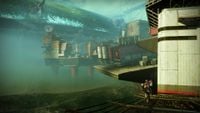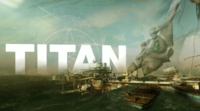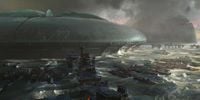Titan (moon)
From Destinypedia, the Destiny wiki
"I don't have time to explain why I don't have time to explain."
This article has new content coming soon from Destiny 2 and may not be complete, confirmed, or correct. Please update it as soon as any relevant and accurate material is available. Editors must cite sources for all contributions to this article. Edits that do not follow this standard will be reverted without notice. For more information, see the Citation policy.
This article has new content coming soon from Destiny 2 and may not be complete, confirmed, or correct. Please update it as soon as any relevant and accurate material is available. Editors must cite sources for all contributions to this article. Edits that do not follow this standard will be reverted without notice. For more information, see the Citation policy.
There is more information available on this subject at Titan (moon) on the English Wikipedia.
| Titan | |
|---|---|

| |
| Astrographical | |
|
Star, position: |
|
| Physical | |
|
Diameter: |
5,150 kilometers |
|
Gravity: |
.14 g |
|
Length of day: |
15.94 days (synchronous) |
|
Atmosphere: |
|
|
Surface temperature: |
−179.2 °C |
| Societal | |
|
Government: |
|
- "The great monuments of mankind's utopian Golden Age now lie toppled or half submerged within the rolling ocean that blankets the entire surface of Titan. All that remains is a flotilla of construction barges and a lone human habitat that serves as the perfect hiding place for some of humanity's scattered forces — and some far more sinister below"
- — Website description
Titan is the largest moon of Saturn.[1] One of the legends of the Nine states that they are ancient leviathan intelligences originating from either Europa or Titan.[2]
Overview
Titan is a methane ocean moon,[note 1] decorated by Golden Age, Hive, and Fallen structures that dominate the planet.
History
During the Golden Age, the Traveler transformed Titan into an ocean moon. Centuries later, the moon would become a warzone for Guardian, Fallen, and Hive forces. The moon can be seen from a distance on the Dreadnaught.
Locations
Adventures
TBA
World Quests
List of appearances
Gallery
A lone Titan scouts out the landscape of Titan
Notes
- ^ Titan's surface is actually mostly water and rock with methane and hydrocarbons being a chief component in its lakes as discovered by the Cassini–Huygens mission. Overall the lakes cover a very small percentage of the surface, making Titan drier than Earth.
References
| ||||||||||||||




